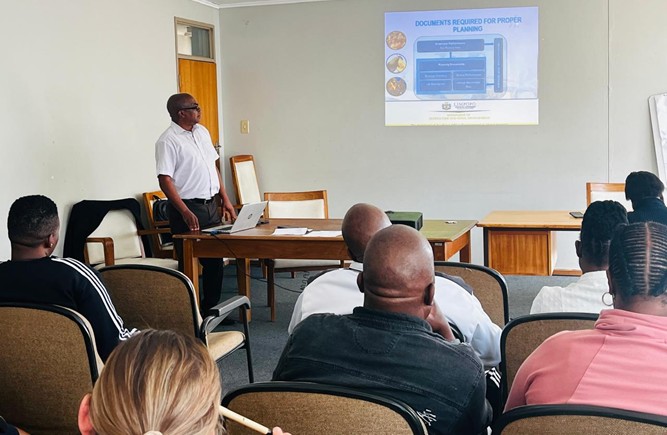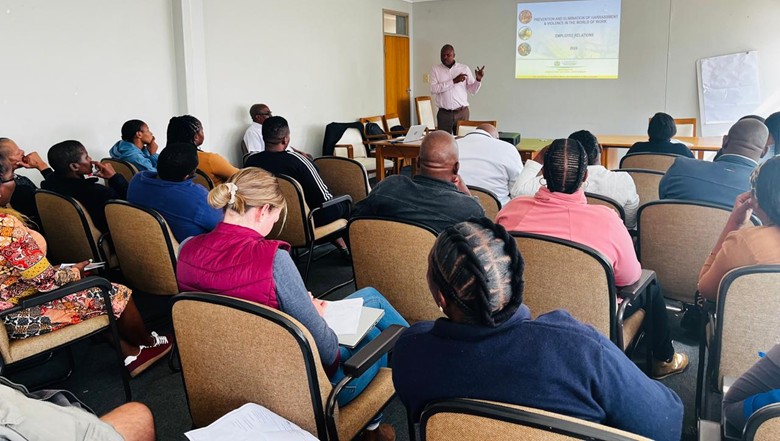By Baakedi Rachidi

Sipho Nhemo delivers presentation on Employee Relations to the District and Agro-ecological East Zone at Modimolle Office.
Employees from the Limpopo Department of Agriculture and Rural Development in the Waterberg District, Agro-ecological East Zone and West Zone offices participated in an intense workshop focused on the Performance Management and Development System (PMDS) and Employee Relations (ER.) These sessions, which were conducted by the Deputy Directors Mr. Phily Mamabolo, Mr. Sipho Nhemo and Mr. Rhudzani Muvhango, were held at the District and Lephalale offices on 14 and 16 May 2025, respectively.
Mr. Mamabolo provided a detailed walkthrough on how to effectively complete PMDS-related documentation. Emphasis was placed on critical areas often misunderstood by employees, including the Job Description, Annual Performance Plan (APP) and Annual Operational Plan (AOP.) He clarified that a proper Performance Agreement (AP) is based on these foundational documentations, aligned to the Department of Agriculture and Rural Development's 5-year plan.
He explained that the APP is submitted to Provincial Treasury. It outlines the department's annual programs and funding needs. The AOP is derived from the APP and specifies individual activities including measurable targets. “Unmeasurable targets should be weighted in percentages and follow the correct template. The Job Description must also follow the correct template, highlighting reporting lines, purpose of the job and its creation rationale”, he said.
Mr Mamabolo further stressed that Key Results Areas (KRAs) must be clearly defined, weighted appropriately (10%-30%) and must reflect actual time spent by the employee. The activities must resemble those stipulated in the Operational Plan (OP.) The activities must be listed in the present tense in the Job Description while the PA should be completed in the past tense.
The contracting template must capture accurate employee and supervisor information, including names, designation, and the correct financial year, emphasising that "it is the date of entry in which you were appointed in the position, not the date of appointment when you started working for the department."
He also addressed the Personal Development Plan (PDP) section, advising employees to specify training needs relevant to their KRAs and provide reason for the identified intervention.
On the topic of assessments, he reminded employees that KRAs are scored between 4 and 6 points, assessments require a reviewed discussion between employee and supervisor before sign-off and that amendments of PAs are permitted between 1st April and 31st December 2025, however not in the final quarter of the financial year. He concluded with insights on Dispute Resolution, emphasising the role of independent mediation, escalation protocols and the importance of resolving issues before formal grievances are pursued.
Following the PMDS session, Mr. Sipho Nhemo as well as Mr. Rhudzani Muvhango in Lephalale delivered a presentation on Employee Relations with a particular focus on the Sexual Harassment Policy. Nhemo began by reiterating the expectation that all public servants maintain high ethical standards. The Policy approved by the MEC for Agriculture and Rural Development aligns with multiple frameworks including the Labour Relations Act, Public Service, Disciplinary Code, Gender Equality Strategic Framework and the Constitution of the Republic of South Africa.
Mr Nhemo defined the scope of workplace harassment which extends beyond the office to include, Department funded workshops, official events, trips sporting and social activities linked to the Department. He elaborated on various forms of harassment which include physical, verbal, sexual, gender based, racial, psychological, cyber bullying and harassment based on religion and disability.
Employees were urged to report any misconduct promptly as cases must be lodged within 6 months of the incident to ensure resolution within 90 days. Complaints must be submitted in writing through Part A of the grievance form first to the supervisor and then forwarded to Employee Relations. He assured colleagues that all cases are treated with confidentiality and urgency. In cases under investigation, alleged perpetrators may be suspended to avoid interference, he stated.
He cautioned that false claims are also subject to disciplinary action. Potential sanctions depending on the severity of proven misconduct include, warnings, suspension up to 3 months without pay, demotion or a combination of these actions resulting in dismissal.
Employees with queries on harassment related issues were encouraged to contact Mr Nhemo directly for guidance and support on 083 485 3343 and/or Email:

Phily Mamabolo clarifies misunderstanding on PMDS.


